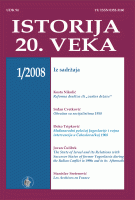OBRAČUN SA SOCIJALISTIMA 1958
THE ENCOUNTER WITH THE SOCIALISTS IN 1958
Author(s): Srđan CvetkovićSubject(s): History
Published by: Institut za savremenu istoriju, Beograd
Keywords: Serbia; democracy; repression; socialism;
Summary/Abstract: This paper deals with the phenomenon of political repression in Serbia during the time of the establishment of self-managed democracy, in the form of periodical public political processes against oppositional individuals and groups. Cases such as the process against the former socialist group Krekić–Pavlović in the Spring of 1958 actually represent universal models of usages of state repression in Yugoslavia, which, in that period, was always in the context of complex foreign and internal affairs in which Yugoslavia floated – between East and West, between liberal democracy and real-socialism. Court proceedings against group Krekić–Pavlović started as an internal political and democratic issue, but soon developed into an international problem. Among other things, it was also used as an argument of Tito`s tightrope act between the two blocks, in his need to persuade the Eastern block and USSR that Yugoslavia was still determinedly on its way to building socialism and that it remained loyal to the Marxist dogma concerning doubts and reserves demonstrated by the East regarding new Program Draft of the Communist Party as well as its approaching to the European Left and Socialist International. This political process, the second arrest of Djilas as well as the second wave of Nationalization were intended to dissuade Doubtful Thomas from the East that Yugoslavia was abandoning socialism, as they perceived it. Still, ideological frustration of British Labour Party and the West caused by violation of basic political and human rights in Yugoslavia (in the first place by the case Djilas and Dedijer as well as the trial to group Krekić–Pavlović) soon gave way to substantial geopolitical interests, concentrated on weakening the eastern block by supporting Tito to move independently from Stalin. In the domestic affairs, this public process had a usual psychological propaganda function of intimidation and disqualification of potential opposition, used by all communist regimes, and represents only one of numerous events which reflected social turbulence in the country during the intensification of international political relations.
Journal: Istorija 20. veka
- Issue Year: 2008
- Issue No: 1
- Page Range: 85-101
- Page Count: 16
- Language: Serbian

